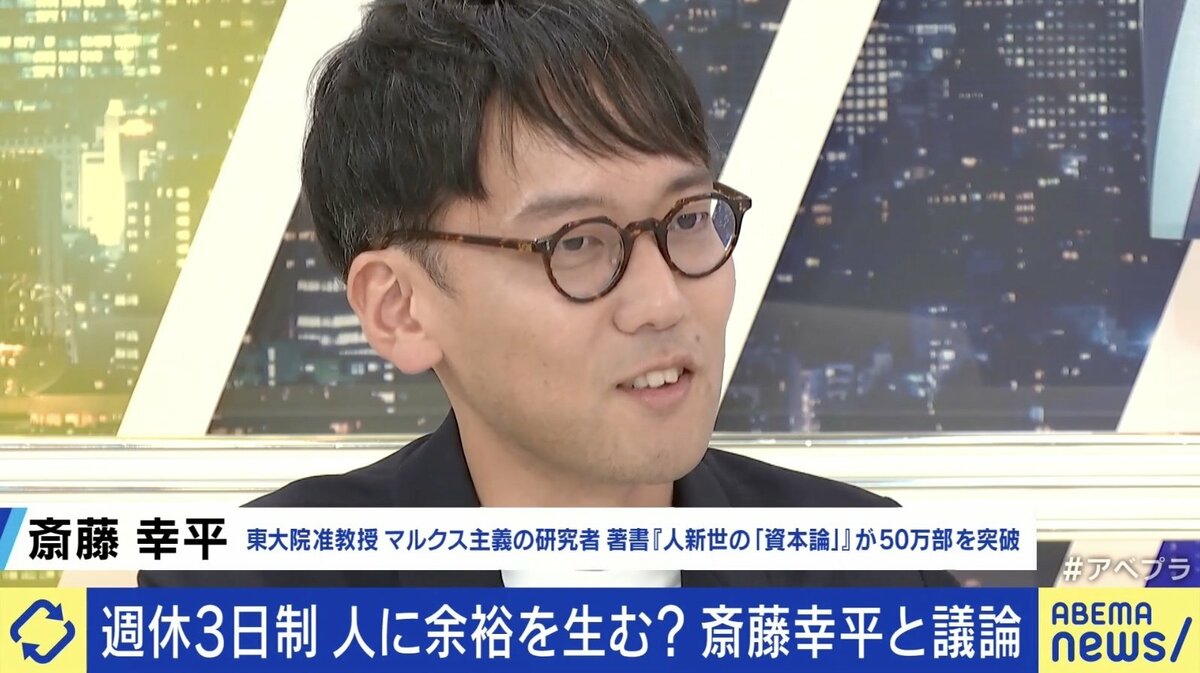【News Citation】
With the continuing heat wave in Japan and reports of abnormal weather such as torrential rains and heat waves around the world, the idea of “degrowth” as a way to stop climate change is attracting attention.
Kohei Saito, Associate Professor of the Graduate School of the University of Tokyo, was one of the first to make this appeal in his book “The ‘Capitalism’ of the New Human Age” in 2020. In “ABEMA Prime,” we spoke with him about the three key elements that are essential to its realization.
De-growth” is the concept of shifting from the pursuit of economic growth and GDP to a sustainable society that emphasizes the environment, happiness, and equality. Will it lead to unhappiness and recession?” Will all industries go out of business?” But this is not the case. Saito’s approach is to provide the services necessary for daily life at no cost, and not to deny the growth of necessary industries.
In order to achieve de-growth, Mr. Saito uses the terms “common,” “income capped,” and “three-day workweek.
Common” refers to public goods such as water, food, electricity, housing, medical care, education, and other “things we cannot live without” that should be democratically managed by citizens themselves, not commercialized. This will lead to the correction of economic disparities, shortening of working hours, and reduction of environmental burdens, according to the report.
The second, “cap on income,” is also a source of revenue for redistribution. In Japan, the income tax rate is capped at 40%, plus the inhabitants’ tax and other taxes, which is about 50%. Most people don’t care about this, so I think it would be a good idea if more people voiced their opinions.
Regarding the third item, “a three-day workweek,” he said, “Everyone is working so much despite the development of technology. It is not right that so many things are running 24 hours a day and wasting energy. We should take more time off. In Europe, social experiments have already been conducted, and the results show that productivity has not changed much,” he said.
I wonder if income caps will bring various sports and cultures to a standstill. “I think it’s okay if people say, ‘Ohtani is so great, but he only gets 100 million yen. What I am aiming for is not a society where people pay high fees to watch games of great players on TV. High school baseball players work so hard, but as soon as they graduate, they stop playing baseball and start working hard. Instead, it is a society where they can continue to play baseball all the time while working and taking three days off a week,” he appealed.
【Citation】

【Personal opinion】
A world where those who work hard are blessed in proportion to their efforts or even more than their efforts, but those who do not or cannot work hard find it difficult to even survive.
A world where the principle of reward for effort is not denied, but the widening of the gap is prevented by a certain line, and a certain level of life is possible regardless of the amount of effort.
which would you prefer?
Until now, many people supported the former, but recently, there are more and more people who think that this level of disparity is not right.
Even if they can’t clearly voice that it’s not right, I think there are many people who are quietly losing their relationships, marriages, and choices to have children, and who have unexpressed frustration.
I think I am blessed in the world (education, income, marriage, family, etc.), but I think this is partly due to my efforts, but also partly due to my environment.
Besides, how long do we have to keep trying and trying? I’ve tried, but I’m getting tired of it.
So I wouldn’t deny the latter.

